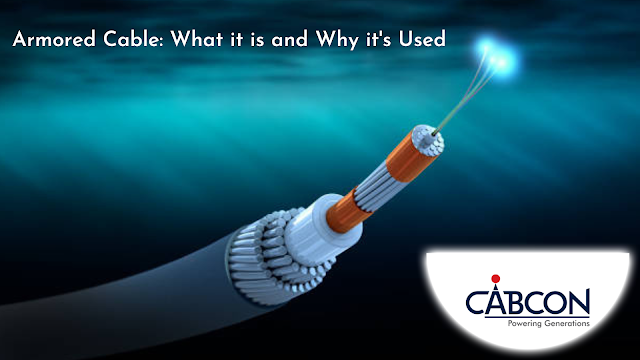Armored cable is a type of electrical cable that is encased in a protective layer of metal or plastic armor. This armor provides added durability and protection against physical damage, making it a popular choice for use in harsh or hazardous environments. In this blog, we'll explore the benefits of using the armored cable and some of the key factors to consider when selecting it for a particular application.
What is Armored Cable?
Armored cable is a type
of electrical cable that is constructed with a metal or plastic outer layer
that serves to protect the inner conductors. The armor is typically made of
metal, such as steel or aluminum, and is designed to withstand physical impacts
and prevent damage to the inner conductors. This makes it an ideal choice for use
in environments where the cable is likely to be exposed to physical stress,
such as construction sites, industrial facilities, and other harsh
environments.
Why Use Armored Cable?
There are several key
benefits to using an armored cable, including:
●
Durability: The metal or plastic armor
provides added protection against physical damage, making the cable more
durable and less likely to fail due to accidental impacts or other physical
stress.
●
Protection against Electromagnetic
Interference (EMI): The metal armor also provides shielding against
electromagnetic interference (EMI), which can cause problems with data
transmission and other electronic systems.
●
Flexibility: Despite its tough exterior, the armored cable is often surprisingly flexible and can be easily bent or routed
around obstacles. This makes it easier to install in tight spaces or around
corners.
●
Resistance to Chemical and Environmental
Hazards: The armor can also provide protection against chemical spills,
corrosive substances, and other environmental hazards, making it ideal for use
in hazardous or potentially explosive environments.
Where to Use Armored Cable?
Armored cable is often
used in industrial and commercial applications, including:
●
Construction sites: The tough exterior of
armored cable makes it ideal for use in construction sites, where it is likely
to be exposed to physical stress and the risk of accidental damage is high.
●
Industrial facilities: In industrial
facilities, armored cables can be used to protect sensitive electrical equipment
from physical damage and EMI.
●
Hazardous environments: In hazardous
environments, such as oil rigs, chemical plants, and other potentially
explosive locations, armored cable can provide added protection against
chemical spills, corrosive substances, and other environmental hazards.
●
Underground installations: Armored cable is
often used for underground installations, where it is protected from physical
damage and the elements.
Choosing the Right Armored Cable
When selecting armored
cable, it is important to consider a number of factors, including:
●
Voltage rating: The voltage rating of the
cable should be appropriate for the intended use, taking into account the
voltage requirements of the electrical equipment and any safety regulations
that may apply.
●
Armor material: The armor material should be
chosen based on the specific requirements of the application, taking into
account factors such as chemical resistance, environmental hazards, and
physical strength.
●
Conductors: The conductors should be chosen
based on the current-carrying capacity required for the application, as well as
any insulation requirements.
●
Cable size: The size of the cable should be
chosen based on the current-carrying capacity required, taking into account any
regulations or safety standards that may apply
Armored cable is a sturdy and protective electrical cable
that is ideal for use in demanding and potentially dangerous environments. It
is designed with a metal or plastic outer layer that provides increased
resistance to physical damage, as well as protection against electromagnetic
interference. This type of cable is highly versatile and can be used in a wide
variety of applications, including construction sites, industrial facilities, hazardous
locations, and underground installations. To ensure that the right type of
armored cable is selected for a specific application, it is important to
consider important factors such as voltage rating, armor material, conductors,
and cable size. Overall, the armored cable is a reliable and secure option for
electrical installations that require added protection and longevity.

Comments
Post a Comment